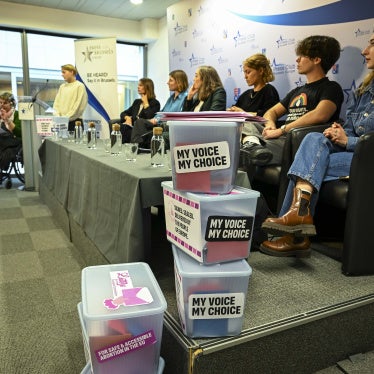Egyptian security forces prevented demonstrators from holding a peaceful protest in Cairo’s Saida Zeinab Square on January 17, arbitrarily detaining 30 demonstrators, Human Rights Watch said today. The protest against cuts in government subsidies was scheduled to take place the day after a visit by US President George W. Bush, who praised Egypt’s “vibrant civil society.”
Witnesses told Human Rights Watch that large numbers of police sealed off the square, where the opposition Kifaya (“Enough”) movement had called for the demonstration to begin at 3 p.m. Police chased away scores of people who tried to reach the square. Plainclothes police detained 30 persons, including journalists, human rights activists, and Kifaya members.
“Egyptian authorities are taking every opportunity to signal to citizens that when it comes to peaceful criticism of government policies, forget about exercising your rights,” said Joe Stork, deputy director of Human Rights Watch’s Middle East division.
Per Bjorklund, a freelance journalist, told Human Rights Watch: “I arrived near the square at 3 p.m. There was a huge police presence, state security and riot control police, and plainclothes. We stopped our taxi well before we got to the square, and we were already seeing lots of police with radios. No one actually made it to the square. I saw at least 10 people being arrested, [and] I spoke through the window of a police van with Muhammad Gamal [a blogger] who told me there were already 10 people in the van when they brought him there. Then I was surrounded by six policemen or so who were shoving me around and took my SIM card and my camera flash [memory].”
Police drove several detainees to the outskirts of Cairo before releasing them. News reports quoted Dr. Abdel Wahhab el-Messiri, Kifaya’s elderly general coordinator, as saying that police forced him into a van with six or seven others and drove them into the desert on the outskirts of Cairo (in the el-Tagamoa el-Khamis area).
Nine others of those detained were questioned at the prosecutor’s office in El-Galaa. Defense lawyers inside the prosecutor’s office told Mina Zekri, program coordinator at the Arabic Human Rights Information Network, that the detainees had been transferred to a police station overnight before being released without charge at around 5 a.m. on January 18.
On January 17, shortly after the events in Saida Zeinab Square, people gathered outside Cairo’s Press Syndicate building. A lawyer who was there told Human Rights Watch that at around 4 or 5 p.m., as she tried to speak with members of the small crowd that was gathering, police manhandled her and seized her mobile phone.
The crackdown came hours after Egypt informed ambassadors from 27 European Union countries of its “complete rejection” of a European Parliament resolution criticizing rights abuses in Egypt. Fathi Surur, Speaker of Egypt’s National Assembly, threatened a day earlier to cut ties with the European Parliament if it passed the resolution. On January 18, Foreign Minister Ahmed Abul Gheit told reporters: “Egypt does not need lessons from anyone, particularly if this party is arrogant and ignorant,” and reiterated that, “Egypt totally rejects attempts by anyone who takes it upon himself to be an investigator of human rights in Egypt.”
“This over-the-top response to criticism from European lawmakers shows Egyptian officials don’t restrict their bullying approach to the streets of Cairo,” Stork said.
During a three-hour visit to the Egyptian resort of Sharm-el-Sheikh on January 16, Bush told President Hosni Mubarak: “I appreciate the example that your nation is setting,” and praised Egypt’s “long and proud tradition for a vibrant civil society.” Bush referred to Egypt’s human rights record only obliquely, praising Egyptian journalists, judges, and “other strong civic and religious leaders who love their country and are determined to build a democratic future.”
“Given the deterioration of human rights in Egypt since President Bush initiated his so-called ‘Freedom Agenda,’ he should have been much more forthright in expressing support for the Egyptian activists who have been trying to exercise those rights,” Stork said.
Egypt is a party to the International Covenant on Civil and Political Rights and as such has specific legal obligations to respect and uphold the right to peaceful assembly protected by Article 21 of the treaty. A state may only limit this right if it is “necessary in a democratic society,” and even then in only certain, specific situations. Egyptian police and security forces’ detention of peaceful protestors violates the right to be free from arbitrary arrest or detention. Article 9 of the covenant requires a state party to provide any victim of unlawful arrest or detention with an enforceable right to compensation.







